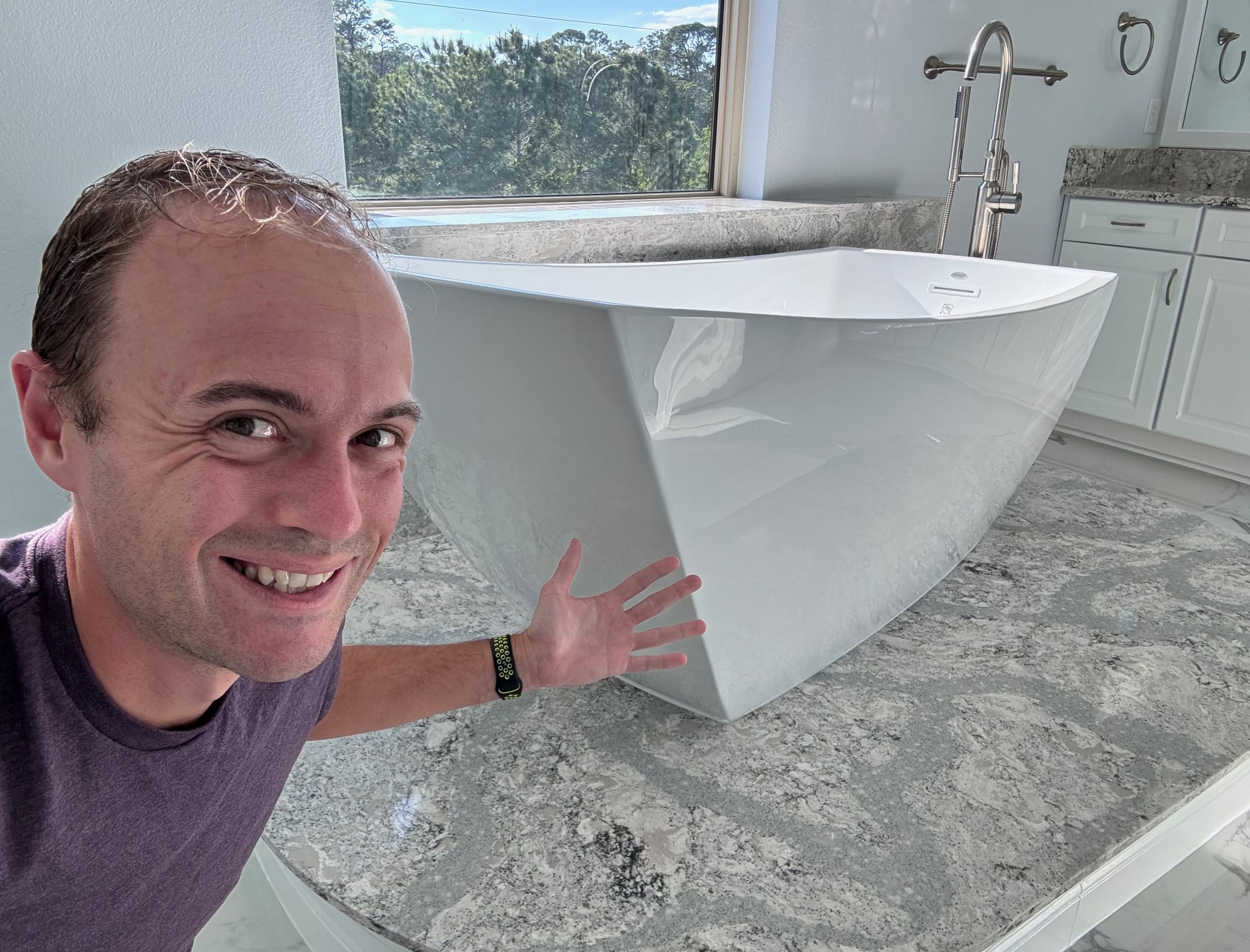You're looking at my e-mail newsletter, Searls of Wisdom, recreated for you here in website form. For the full experience, subscribe and get it delivered to your inbox each month!
Searls of Wisdom for March 2024
Don't tell March that it's a short month—we got a lot done!
For starters, we completed our first major home renovation since moving in. Apart from twisting my insides into knots from self-inflicted stress, everything went totally fine and all our contractors were awesome.

I also found occasion to extract my first new open source library of 2024 while working on the new Better with Becky app. If you're a Rails developer and have ever felt uneasy about how easy it is to destroy models, check it out!
But I'm writing to you about something else that made my March especially memorable. An old friend came to visit that I hadn't seen in years. His name is chronic back pain, and he's a real son of a bitch.
Let's get our pre-existing conditions on the table: in my late teens, I was diagnosed by a family friend / radiologist with Scheuermann's disease. Since this was in the pre-Obamacare days, I asked him to double check the X-rays. The last thing I wanted was to have to write such a hard-to-spell name on every medical history form for the rest of my life, especially if omitting it could result in an insurance provider rescinding my coverage.
Since he was a family friend, the radiologist did me a solid: he triple checked my scans and, just for good measure, threw another German name on the pile by offering a secondary diagnosis of Schmorl's nodes. He called them "cavities" in my vertebrae, but after consulting with my current doctor (ChatGPT), they're apparently more accurately described as indentations and herniations of vertebral discs.
Cool.
I was fortunate to get this diagnosis at such a young, dumb age that it didn't really phase me. I was still invincible back then, and blissfully focused on other problems. The Iraq War's sequel was just getting underway, after all. And as if Bush hadn't dropped enough bombs, Gigli was about to hit theaters. Between working two retail jobs and the fact most of my friends lived 30 minutes away, I was much more worried about gas prices soaring to $1.60 per gallon than over whether I'd manage to find a comfortable office chair in my late 30s.
A year and change passed. My back was fine.
Until it was not fine
One random morning my sophomore year of college, I woke up in the top bunk of my dorm room and I couldn't swing my leg over the edge to make contact with the ladder like I normally did. In fact, I couldn't seem to get down at all. I gripped the edge of the bed frame with my fingers and awkwardly swooped my stiff board of a body onto the floor beneath. I hobbled to the bathroom but couldn't sit on the toilet. My back just… stopped moving below my chest.
I grabbed some underwear and socks from a drawer, but I didn't have a prayer of reaching far enough to get either over my feet. I just stared at my shorts helplessly as my predicament dawned on me: I was completely immobilized, I had class in 30 minutes, and I couldn't dress myself.
Panic began to set in. What if I missed class? What if I was experiencing the first stages of paralysis and I was about to lose the ability to walk? What if I died penniless and alone?
I leaned over my desk chair to e-mail my professors that I'd be missing class. I carefully catapulted myself off my dresser and launched myself back into bed.
When I woke up that afternoon, my back was totally fine. I could sit and stretch and bend. No problem climbing down the bed. It was like the episode had just been a bad dream.
Unfortunately, like most of my nightmares, this one recurred. And frequently.
By the midpoint of sophomore year, I was missing class one full day a week on average. It was like Groundhog's Day—every morning started the exact same way: no pain, just crippling immobility. If I could muster enough flexibility to dress myself, I'd go to class. If not, I'd call in sick.
Being at a liberal arts college with small class sizes meant students couldn't hide anonymously in cavernous lecture halls, so it didn't take long for my professors to take an interest in my chronic absenteeism. My grades started to suffer. I went to the doctor and rather than consult with me about lifestyle changes or suggest physical therapy, he just prescribed a bottle of elephant-grade muscle relaxers. I tried going to a chiropractor, too, but the dude practiced out of a creepier-than-usual basement in his family's home and he spent most of the appointment telling me about his favorite PC games.
This cycle carried on for a couple years. I began to develop a profound fear of sleep that I still deal with today. Since these episodes always occurred first thing in the morning—a literal waking nightmare—I could stave them off by forcing myself to stay awake.
Overall, though, even though I was effectively forfeiting a day of my life every two weeks to extreme immobility, I feel like I did a decent enough job of masking it from others by incorporating it into my persona as a serially unreliable, self-absorbed college student. Even now, I'm surprised how much I've had to sit and reflect in order to recall all of this, as if I did too good a job of de-emphasizing it in the stories I tell myself about my college experience.
Then, shortly before graduation, the back issues stopped as suddenly as they started.
At which point, I was fine
Apart from being able to twist my back in either direction and making loud cracking sounds that both people and pets in my vicinity find distressing, the next ~20 years were pretty uneventful on this front.
Then March 2024 rolled around and…
The biggest difference between present-day me and my college-age self is that I'm significantly smarter and hotter than I was back then. I spent my early 20s rocking a finely-tuned dad bod, as I subsisted on Krispy Kreme donuts and Papa John's pizza while limiting exercise to infrequent and lackadaisical pedalling on an elliptical at the campus field house. Today, I don't like donuts or pizza or lethargy any less than I did back then, I'm just way better at denying myself the things that make me happy in the name of health and fitness.
And yet, out of nowhere, my back issues are back. I don't know why. I have no way of knowing if they'll disappear a second time or if they plan to take up permanent residence. And even though I'm a Much Better Person by nearly every measure today than the last time I went through this, I worry that I'm not as well-equipped to deal with it as I was as a college student.
First, I'm way more active now.
I loved slacking off in college, but the eight or nine days this month I've consigned myself to lying around at home have felt like an excruciating waste of precious time. My body feels like a dog begging to be taken for a walk and I have no choice but to repeatedly refuse. My mind is busy with ideas and opportunities, but the fatigue of constant discomfort results in my staring blankly out the window instead.
Second, I'm an actually reliable person now.
Back in college, I didn't think twice about cancelling plans, shirking commitments, or inconveniencing others, but it's unthinkable to me now. Today, when I commit to someone, I follow through. If we make plans, I'm there on time or early. And when my inability to get out of bed results in somebody feeling held back somehow, I feel sharp pangs of guilt that I might carry for weeks or months.
Third, I'm committed to improving myself now.
When I was younger, I responded to problems like this by sticking my head in the sand, either downplaying them as not being serious or denying I had the agency to fix them. When the going got tough, I'd pop a muscle relaxer and forget the next 12 hours of my life. Today, instead of ignoring my problems, I fixate on them until they're solved. When I'm not following a yoga program to increase lower back mobility, I'm planking to strengthen my core, dangling from an inversion table to release tension, or sitting in an infrared sauna to reduce inflammation. I've gone from doing too little to too much.
The worst part is, everything I'm doing is actually working! Now, instead of being helplessly incapacitated all day, I'm successfully able to restore my mobility therapeutically. But as it turns out, mobility alone isn't enough. Because once I'm able to get my lower back moving again, I'm at constant risk of experiencing agonizing, brain-splitting pain.
To give an idea of what it's like, my spine sort of feels like a walking Jenga tower, with each vertebrae a layer. Each footstep begins with my pulling a piece from the tower. Unless my foot lands to place that piece back just so, a disc will slip and I might literally collapse in pain. I walk around the house as if I'm balancing a pineapple on my head—grateful to be moving at all, but terrified that the most subtle reach or rotation could send me reeling. It's so discouraging that Dr. ChatGPT cited my concern as exhibiting the "Fear-Avoidance Model" of fearing pain leading to inactivity leading to worsened pain.
I've thrown out my back three times this month. Each time I've successfully recovered my mobility more quickly than the time before. Each time I've done a better job of identifying and avoiding pain triggers while my back healed. So that's good, at least.
The reason I wrote about this today (apart from the fact that when you're experiencing extreme pain, it's hard to think about much else) is that this is turning out to be one of the few challenges in my life that can't be solved through extreme discipline and rigor. When total immobility and searing pain sit at opposite ends of a spectrum, the only solution is to strike the right balance—where "right" exists as a fulcrum point that gradually moves from the moment of injury to the point of complete recovery.
In the context of my career, I've always been drawn to problems that don't have clear right and wrong answers. I've spent hundreds of hours exploring vexing problems in programming and sometimes all I have to show for it are variations on the phrase, "it depends." I have become extremely comfortable negotiating trade-offs in order to settle for solutions that are merely "good enough". I'm prone to using the word "tension" in a figurative sense and I can tell people find it off-putting, but I keep doing it anyway.
But when it comes to my personal life, I've rarely found room for balance. Run 5K as fast as you can every day and never miss a day. Check off every to-do on time and never drop a ball. Travel as light as possible and never check a bag. Strive for striving's sake.
That's why, in a sense, I'm grateful that my back issues have returned. It's something I can't solve by sheer grit or force of will. Dealing with my back will force me to learn how to balance pushing myself while also respecting my limitations. It might take me years to dial it in. We'll see how it goes.
Anyway, I'd better wrap it up here, or else I might get the idea that this lesson can be applied elsewhere.


